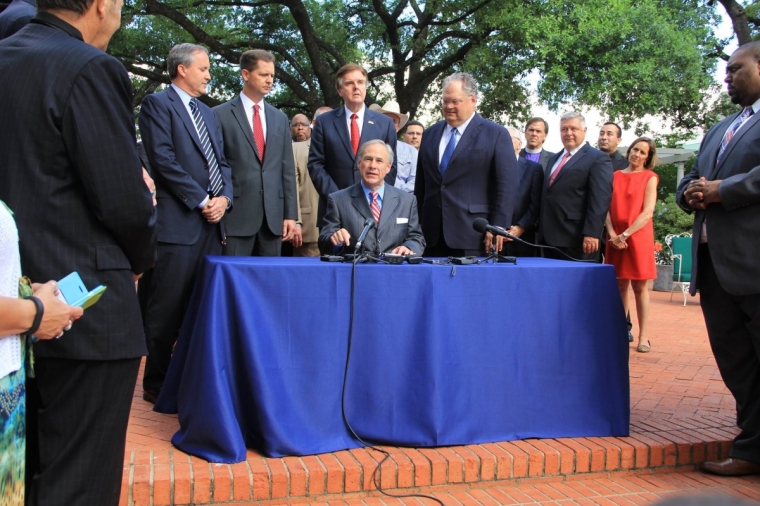Texas governor: First Amendment, not Supreme Court ruling, is priority

AUSTIN, Texas (Christian Examiner) – Texas Gov. Greg Abbott has issued a memo to all state agencies instructing them to prioritize compliance with laws that protect the religious freedom of the state's employees as they deal with the fallout of the Supreme Court's 5-4 decision in Obergefell v. Hodges, which legalized gay marriage in all 50 states.
"As leaders of this State, we have an obligation to secure the right of all Texans to live their lives according to the principles of their religious faith," Abbott wrote.
"Texans of all faiths must be absolutely secure in the knowledge that their religious freedom is beyond the reach of government. Renewing and reinforcing that promise is all the more important in light of the Supreme Court's decision in Obergefell v. Hodges. The government must never pressure a person to abandon or violate his or her sincerely held religious beliefs regarding a topic such as marriage."
In the memo June 26, Abbott wrote that the United States was founded by people who "sought a place to worship God according to the dictates of conscience and free from government coercion," and that is why they ensured religious freedom was first freedom guaranteed by the Constitution.
...The Texas RFRA enshrines the foundational principle that religious liberty confined to a sanctuary is not liberty at all, and religious freedom limited to one's home or thoughts is not freedom at all. The law protects religious liberty not only in houses of worship—but also in schools, in businesses, in the military, in public forums, and in the town square. These protections are afforded to all people, of all faiths.
In addition to the First Amendment, Abbott said the Texas Constitution and the Texas Religious Freedom Restoration Act ensure state agencies cannot substantially burden a person's free exercise of religion. The recent Supreme Court decision does not change that, he wrote.
Abbott said the Texas RFRA "enshrines the foundational principle that religious liberty confined to a sanctuary is not liberty at all, and religious freedom limited to one's home or thoughts is not freedom at all. The law protects religious liberty not only in houses of worship—but also in schools, in businesses, in the military, in public forums, and in the town square. These protections are afforded to all people, of all faiths."
Abbott said the Supreme Court decision will test the nation's tolerance of religious opinions and could result in the marginalization of people whose religious beliefs or conscience will not allow them to participate in or endorse same-sex marriages. Abbott said that is the reason state agency heads need to refocus their commitment to religious liberty.
"All state agency heads should ensure that no one acting on behalf of their agency takes any adverse action against any person, as defined in Chapter 311 of the Texas Government Code, on account of the person's act or refusal to act that is substantially motivated by sincere religious belief. This order applies to any agency decision, including but not limited to granting or denying benefits, managing agency employees, entering or enforcing agency contracts, licensing and permitting decisions, or enforcing state laws and regulations," Abbott wrote.
Earlier in the day June 26, Abbott issued a statement saying the Supreme Court had abandoned its rule as an impartial judge of what was legal and had instead assumed powers designated in the Constitution to the legislatures of the states.
Abbott also called attention to the state's new Pastor Protection Act, which – which in addition to the U.S. Constitution, Texas Constitution and Texas RFRA – provides "robust legal protections" to Texans whose faith commands them to adhere to the traditional understanding of marriage.
Under the law, passed as the Texas legislature ended its session in early June, Texas ministers may not be forced to perform or solemnize any marriage they deem contrary to their religious opinions. Churches are also exempted from providing services or facilities for same-sex marriages. Under the law, pastors and churches are also immune from civil suits for refusing to perform same-sex marriage ceremonies.
Civil employees, however, are not.
In a statement from his office, Texas Attorney General Ken Paxton said "any clerk who wishes to defend their religious objections and who chooses not to issue licenses may well face litigation and/or a fine. But, numerous lawyers stand ready to assist clerks defending their religious beliefs, in many cases on a pro-bono basis, and I will do everything I can from this office to be a public voice for those standing in defense of their rights."
"Texas must speak with one voice against this lawlessness, and act on multiple levels to further protect religious liberties for all Texans, but most immediately do anything we can to help our County Clerks and public officials who now are forced with defending their religious beliefs against the Court's ruling."